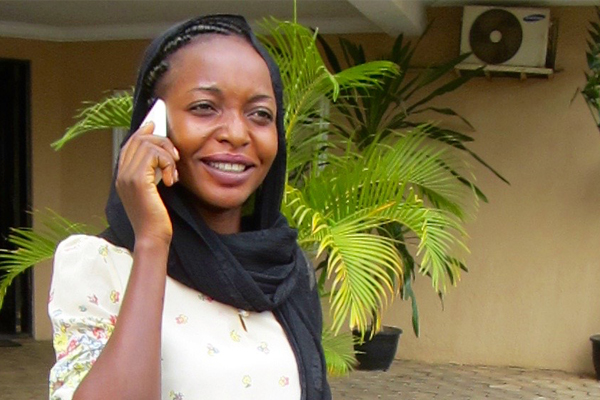The same phone technology that allows us to “press 1 to make a same-day appointment” can be used to get spouses in Africa to talk to each other about family planning and increase the use of modern contraception.
Through the use of what is called interactive voice response (IVR) technology, the Johns Hopkins Center for Communication Programs found that allowing callers to choose just the content they wanted to hear is an effective way to help prepare women and couples to become informed and engaged clients of family planning services. The innovative tools use proven entertainment education approaches to put serial dramas, personal testimonies and sample family planning conversations just a simple free phone call away.
“When people think about mobile phones, they think of apps and text messages, but I think audio is still a very popular medium,” says CCP’s Caitlin Loehr, who was on the team that developed the “Smart Client” and “Smart Couple” tools. “The IVR technology is easy to use and it’s something most people already have. And now we are using it to make it easier for people to have real conversations about family planning and make healthy decisions.”
The original idea behind “Smart Client” was to develop a digital tool to prepare women for family planning counseling, allowing them to be more informed and confident to speak up once they attended their sessions. Mobile apps can’t reach people without smartphones and text-based services aren’t always as helpful in low-literacy areas, so CCP decided to try IVR.
Clients can listen to as little or as much of the programming as they choose. On average, they listened to 4.5 to six minutes of the calls which were part of a series of 17 calls, including some calls that quizzed women on what they had already learned. “Smart Couple” was created when women told the CCP team that they would call back to have their husbands listen. “Smart Couple” is very similar to the original, but it includes additional personal stories from men and text messages to encourage couples to communicate. One text noted that a character in the drama complimented his wife on her cooking, suggesting that each member of the couple find something to compliment his or her spouse about.
Both tools were developed under the Health Communication Capacity Collaborative (HC3) program and pre-tested with audiences in Nigeria and Cote d’Ivoire. In 2017, user studies of both tools were conducted in Kaduna, Nigeria to measure the impact of the tools on how users think, feel, act and intend to act related to family planning. The “Smart Client” study included 92 women and 670 women and 652 men participated in the “Smart Couple” study. Participants in both groups gave very positive feedback and the studies found significant positive behavioral effects.
For example, women who used “Smart Client” were twice as likely to feel confident discussing family planning with a provider after using it as compared to before (35.5 percent versus 73.6 percent), and following the study, nearly all women had recently discussed desired family size with their spouse (65.2 percent versus 98.5 percent). The number of women using a modern method of contraception more than doubled after women used “Smart Client” (from 28.8 percent to 63.5 percent).
Likewise, after being exposed to “Smart Couple,” nearly 92 percent of women and men said they discussed family planning with their spouse, up from 58.2 percent and 55.4 percent of women and men, respectively, prior to the study. Also, similar to the “Smart Client” study, the proportion of all “Smart Couple” study participants who reported currently using modern contraception increased significantly with exposure to the tool – from 35.8 percent to 50 percent for women, and from 35.3 percent to 41.3 percent for men.
There were also many insights gleaned throughout the testing related to the technology. Since IVR has never been used in this way before, the project team analyzed how long study participants listened to the calls, patterns in their listening choices, the time of day that participants answered the call and response rates to quiz and survey questions. These findings informed the recommendations included in an adaptation guide which includes suggestions about how much content to include, how to monitor and evaluate the tools and how to set up an IVR platform.
CCP is expecting to use these tools in some of its new work through the USAID-funded Breakthrough ACTION project and the Bill & Melinda Gates Foundation-funded Nigeria Urban Reproductive Health Initiative (NURHI). Full scripts and audio files are currently available in French, Pidgin, Yoruba and Hausa and can be adapted by anyone.
“Having a drama on the phone is not something that has been done before,” Loehr says. “But people really responded well to having this entertainment education in the palm of their hands on a device they already use every day. With a few tweaks, we think IVR could really make a difference in helping women and couples make informed decisions about contraception.”





